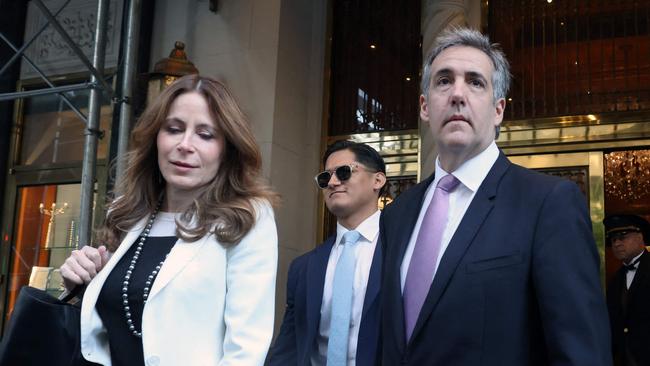Michael Cohen’s ‘credibility’ boosts Donald Trump’s hopes, in court and election
If Donald Trump’s hush-money trial were being held in a city less politically biased against him, it would have been pretty much over on Monday, the 19th day of the criminal case.

If Donald Trump’s hush-money trial were being held in a city less politically biased against him, it would have been pretty much over on Monday, the 19th day of the former president’s criminal case.
The prosecution’s star witness, former Trump lawyer Michael Cohen, undermined his already questionable credibility a second time, and potentially with it the prosecution’s case.
After last week implying, on the stand, that he might have been lying about an allegedly incriminating phone call to Mr Trump in 2016, Mr Cohen admitted stealing $US30,000 from the Trump Organisation.
“You did steal from the Trump Organisation based upon the expected reimbursement from Red Finch,” Trump lawyer Todd Blanche asked during cross-examination, referring to funds Mr Cohen was meant to pay to an internet company but instead pocketed a percentage himself.
“Yes sir,” Mr Cohen said in response, an admission that adds thief to convicted liar on Mr Cohen’s dubious rap sheet. He also said he had previously told prosecutors about the theft, but was never charged, a reminder of how arbitrary prosecutions can be when politics is involved.
It was the only clear crime the trial of Mr Trump, 77, has so far revealed in more than three weeks of evidence and cross-examination of witnesses.
The former president is facing 34 potential felony charges over allegations he paid off porn star Stormy Daniels in the lead-up to the 2016 election to buy her silence over an alleged sexual encounter between the two in 2006, which could have politically damaged the then Republican presidential candidate.
Mr Cohen’s admission of larceny followed an earlier, almost as devastating, implication last week that he might have made up the details of an October 2016 phone call supposedly between him and Mr Trump.
Convicting a defendant beyond reasonable doubt is a high bar. The prosecution’s case rests in large part on the credibility of Mr Cohen’s testimony: that Mr Trump knowingly authorised the payments with the intent to subvert federal election laws.
The defence has had almost a week to sow doubt in jurors’ minds about Mr Cohen’s credibility: it’s amply clear he loathes the former president, in part because he refused to consider him for a job in the administration after winning the 2016 election.
Could Mr Cohen be exaggerating or embellishing the truth in order to see his former boss behind bars? It’s a distinct possibility given the evidence presented.
An acquittal would be an extraordinary coup for Mr Trump, given his recent experience with Manhattan courts, which found him guilty in a series of civil trials related to defamation and business fraud.
The sheer number of criminal charges levelled at Mr Trump by state and federal prosecutors last year created a sense of inevitability that he would be convicted on at least one of them.
That’s no longer the case: three of the criminal cases, including related to classified documents and the 2021 January 6 violence, are unlikely to begin before the presidential election.
Mr Trump’s prospects of winning in November have risen throughout the trial, according to an average of political betting markets tracked by RealClear Politics. Polls in recent weeks continue to give him the edge in critical battleground states and nationally.
But an acquittal is no guarantee, given the likely political bias of the jury of seven men and five women, who are expected to begin their deliberations next week.
Much will depend on their personal feelings toward Mr Trump and Mr Cohen.




To join the conversation, please log in. Don't have an account? Register
Join the conversation, you are commenting as Logout